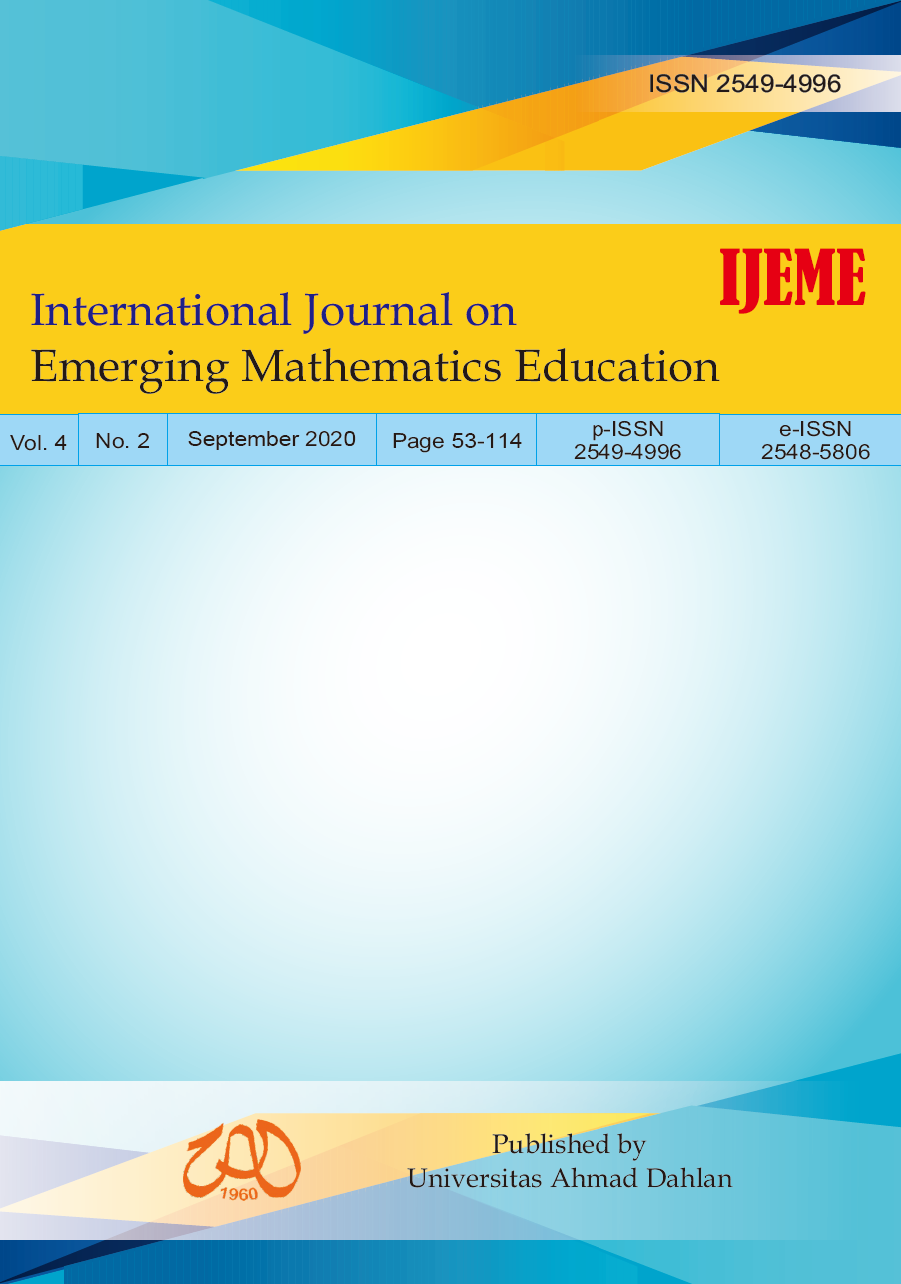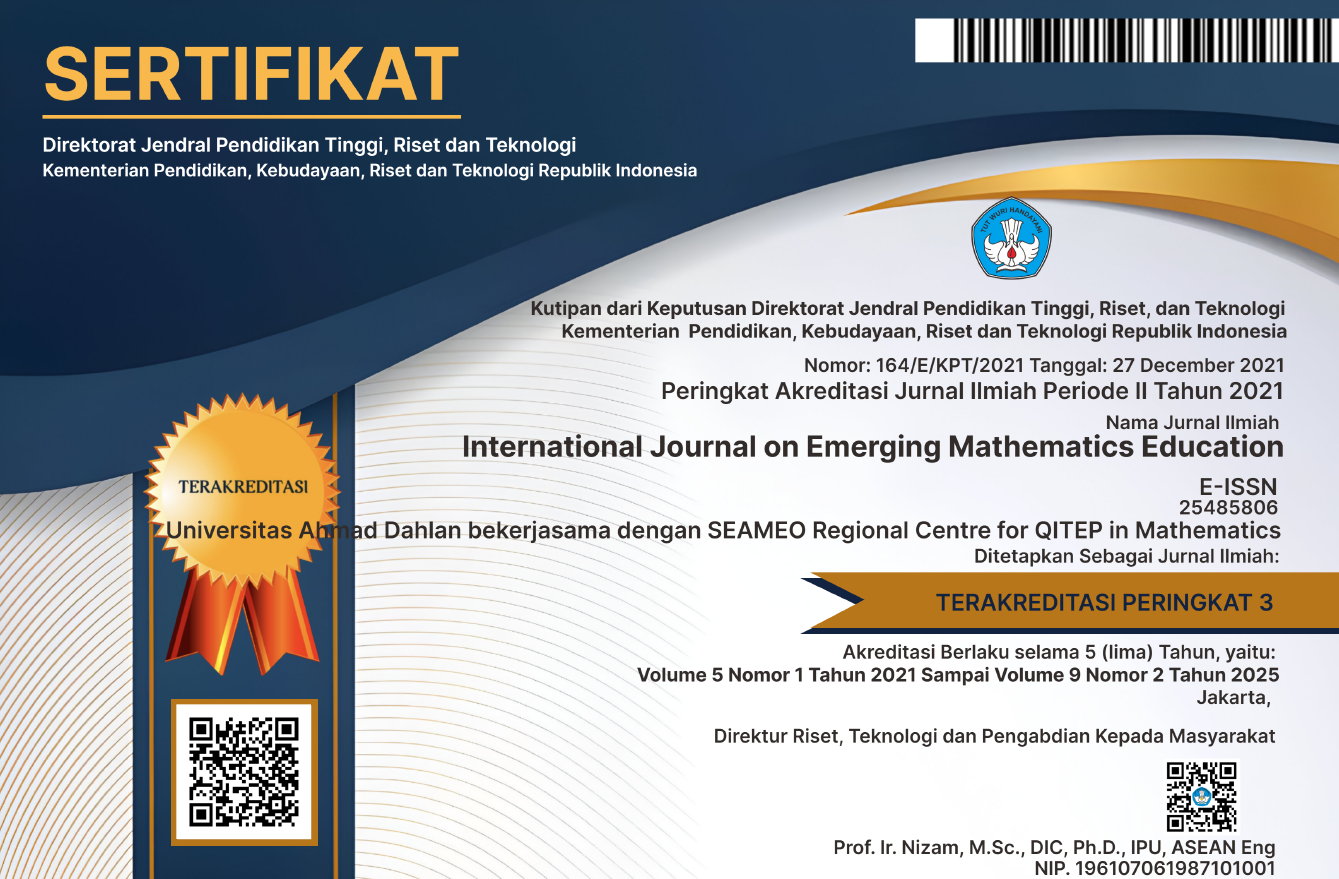Virtual Class During COVID 19: A Self-Regulated Learning Study Of Mathematics Pre-Service Teacher
DOI:
https://doi.org/10.12928/ijeme.v4i2.16671Keywords:
Virtual Learning, Self Regulated Learning, Prior KnowledgeAbstract
The massive spread of COVID 19 has disrupted the entire system of human life, including the education system. The policy decided by the Indonesian government regarding the learning process must be based online and the university's quick response by taking the initiative to use virtual classroom-based learning. However, with virtual classroom-based learning, independence is the main keyword for the success of student learning processes. The implementation of the virtual classroom-based learning process is based on constructivism theory. Student's initial knowledge becomes important in constructivist classes in achieving learning goals. This research is pre-experimental research with one shoot case study design. Determination of the research sample by purposive sampling technique with a sample size of 33 students of mathematics teacher candidates at Majalengka University. The statistical analysis used was Anova one path. The results showed that the scale of self-regulated learning for mathematics teacher candidates differed significantly based on initial knowledge categories (high, medium, and low). This study concludes that initial knowledge is an important part of student success in virtual classroom-based learning.
References
Aksan, N. (2009). A descriptive study: epistemological beliefs and self-regulated learning. Procedia-Social and Behavioral Sciences, 1(1), 896–901.
Alexiou, A., & Paraskeva, F. (2010). Enhancing self-regulated learning skills through the implementation of an e-portfolio tool. Procedia-Social and Behavioral Sciences, 2(2), 3048–3054.
Alghamdi, A., Karpinski, A. C., Lepp, A., & Barkley, J. (2020). Online and face-to-face classroom multitasking and academic performance: Moderated mediation with self-efficacy for self-regulated learning and gender. Computers in Human Behavior, 102, 214–222.
Almarzooq, Z., Lopes, M., & Kochar, A. (2020). Virtual learning during the COVID-19 pandemic: a disruptive technology in graduate medical education. Journal of the American College of Cardiology.
Anhusadar, L. (2020). Persepsi Mahasiswa PIAUD terhadap Kuliah Online di Masa Pandemi Covid 19. KINDERGARTEN: Journal of Islamic Early Childhood Education, 3(1).
Barnard, L., Lan, W. Y., To, Y. M., Paton, V. O., & Lai, S.-L. (2009). Measuring self-regulation in online and blended learning environments. The Internet and Higher Education, 12(1), 1–6.
Borasi, R., & Siegel, M. (1989). Reading To Learn Mathematics: A New Synthesis of the Traditional Basics.
Bušelić, M. (2012). Distance Learning--concepts and contributions. Oeconomica Jadertina, 2(1), 23–34.
Cakir, M. (2008). Constructivist approaches to learning in science and their implications for science pedagogy: A literature review. International Journal of Environmental and Science Education, 3(4), 193–206.
Campbell, D. T., & Stanley, J. C. (2015). Experimental and quasi-experimental designs for research. Ravenio Books.
Cazan, A.-M. (2012). Self regulated learning strategies--predictors of academic adjustment. Procedia-Social and Behavioral Sciences, 33, 104–108.
Chick, R. C., Clifton, G. T., Peace, K. M., Propper, B. W., Hale, D. F., Alseidi, A. A., & Vreeland, T. J. (2020). Using Technology to Maintain the Education of Residents During the COVID-19 Pandemic. Journal of Surgical Education.
Cordova, J. R., Sinatra, G. M., Jones, S. H., Taasoobshirazi, G., & Lombardi, D. (2014). Confidence in prior knowledge, self-efficacy, interest and prior knowledge: Influences on conceptual change. Contemporary Educational Psychology, 39(2), 164–174.
Curtain, R. (2001). Promoting Youth Employment through Information and Communication Technologies (ICT): Best Practice Examples in Asia and the Pacific. ILO/Japan Tripartite Regional Meeting on Youth Employment in Asia and the Pacific. Bangkok.
Daniel, S. J. (2020). Education and the COVID-19 pandemic. Prospects, 1–6.
Dochy, F. J. R. C. (1988). The" Prior Knowledge State" of Students and Its Facilitating Effect on Learning: Theories and Research. ERIC.
Ernest, P. (1993). Constructivism, the psychology of learning, and the nature of mathematics: Some critical issues. Science & Education, 2(1), 87–93.
Ernest, P. (1994). Constructivism: Which form provides the most adequate theory of mathematics learning? Journal Für Mathematik-Didaktik, 15(3–4), 327–342.
Fernández, G., & Morris, R. G. M. (2018). Memory, novelty and prior knowledge. Trends in Neurosciences, 41(10), 654–659.
Fraenkel, J. R., Wallen, N. E., & Hyun, H. H. (2011). How to design and evaluate research in education. New York: McGraw-Hill Humanities/Social Sciences/Languages.
Garcia, R., Falkner, K., & Vivian, R. (2018). Systematic literature review: Self-Regulated Learning strategies using e-learning tools for Computer Science. Computers & Education, 123, 150–163.
Ghavifekr, S., & Rosdy, W. A. W. (2015). Teaching and learning with technology: Effectiveness of ICT integration in schools. International Journal of Research in Education and Science, 1(2), 175–191.
Glogger-Frey, I., Deutscher, M., & Renkl, A. (2018). Student teachers’ prior knowledge as prerequisite to learn how to assess pupils’ learning strategies. Teaching and Teacher Education, 76, 227–241.
Hailikari, T., & others. (2010). Assessing university students’ prior knowledge.
Harackiewicz, J. M., Barron, K. E., Tauer, J. M., & Elliot, A. J. (2002). Predicting success in college: A longitudinal study of achievement goals and ability measures as predictors of interest and performance from freshman year through graduation. Journal of Educational Psychology, 94(3), 562.
Harkness, S. S. (2009). Social constructivism and the believing game: A mathematics teacher’s practice and its implications. Educational Studies in Mathematics, 70(3), 243–258.
Harrell, S., & Bynum, Y. (2018). Factors affecting technology integration in the classroom. Alabama Journal of Educational Leadership, 5, 12–18.
Heggart, K. R., & Yoo, J. (2018). Getting the most from google classroom: A pedagogical framework for tertiary educators. Australian Journal of Teacher Education, 43(3), 9.
Hevriansyah, P., & Megawanti, P. (2017). Pengaruh kemampuan awal terhadap hasil belajar matematika. JKPM (Jurnal Kajian Pendidikan Matematika), 2(1), 37–44.
Hulse, R. (2019). The Use and Implementation of Google Classroom in a Japanese University.
Iftakhar, S. (2016). Google classroom: what works and how. Journal of Education and Social Sciences, 3(1), 12–18.
Kumar, J. A., & Bervell, B. (2019). Google Classroom for mobile learning in higher education: Modelling the initial perceptions of students. Education and Information Technologies, 24(2), 1793–1817.
Ledermüller, K., & Fallmann, I. (2017). Predicting learning success in online learning environments: Self-regulated learning, prior knowledge and repetition. Zeitschrift Für Hochschulentwicklung, 12(1), 79–99.
Leontyeva, I. A. (2018). Modern distance learning technologies in higher education: Introduction problems. Eurasia Journal of Mathematics, Science and Technology Education, 14(10), em1578.
Lerman, S. (1989). Constructivism, mathematics and mathematics education. Educational Studies in Mathematics, 20(2), 211–223.
Lesh, R. (2000). Beyond constructivism: Identifying mathematical abilities that are most needed for success beyond school in an age of information. Mathematics Education Research Journal, 12(3), 177–195.
Lestari, W. (2017). Pengaruh Kemampuan Awal Matematika dan Motivasi Belajar Terhadap Hasil Belajar Matematika. Jurnal Analisa, 3(1), 76–84.
Liang, L., Ren, H., Cao, R., Hu, Y., Qin, Z., Li, C., & Mei, S. (2020). The Effect of COVID-19 on Youth Mental Health. Psychiatric Quarterly, 1–12.
Melisa, I. (2019). Pengembangan Media Pembelajaran Berbasis E-Learning Pada Mata Kuliah Perkembangan Peserta Didik Di Jurusan Pendidikan Teknik Elektronika Universitas Negeri Makassar. Universitas Negeri Makasar.
Merchant, Z., Goetz, E. T., Cifuentes, L., Keeney-Kennicutt, W., & Davis, T. J. (2014). Effectiveness of virtual reality-based instruction on students’ learning outcomes in K-12 and higher education: A meta-analysis. Computers & Education, 70, 29–40.
Moos, D. C., & Azevedo, R. (2008). Self-regulated learning with hypermedia: The role of prior domain knowledge. Contemporary Educational Psychology, 33(2), 270–298.
Ng, Y.-M., & Peggy, P. L. (2020). Coronavirus disease (COVID-19) prevention: Virtual classroom education for hand hygiene. Elsevier.
Odinokaya, M., Krepkaia, T., Karpovich, I., & Ivanova, T. (2019). Self-Regulation as a Basic Element of the Professional Culture of Engineers. Education Sciences, 9(3), 200.
Pintrich, P. R. (2000). The role of goal orientation in self-regulated learning. In Handbook of self-regulation (pp. 451–502). Elsevier.
Quesada-Pallarès, C., Sánchez-Marti, A., Ciraso-Cali, A., & Pineda-
Herrero, P. (2019). Online vs. Classroom Learning: Examining Motivational and Self-Regulated Learning Strategies Among Vocational Education and Training Students. Frontiers in Psychology, 10.
Ratnaningsih, P. W. (2019). The Use of Google Classroom Application for Writing and Speaking in English Education Class. Indonesian EFL Journal: Journal of ELT, Linguistics, and Literature, 5(1), 93–110.
Romero, L., Saucedo, C., Caliusco, M. L., & Gutiérrez, M. (2019). Supporting self-regulated learning and personalization using ePortfolios: a semantic approach based on learning paths. International Journal of Educational Technology in Higher Education, 16(1), 16.
Schmid, R. F., Bernard, R. M., Borokhovski, E., Tamim, R., Abrami, P. C., Wade, C. A., Surkes, M. A., & Lowerison, G. (2009). Technology’s effect on achievement in higher education: a Stage I meta-analysis of classroom applications. Journal of Computing in Higher Education, 21(2), 95–109.
Seltman, H. J. (2018). Experimental design and analysis.
Sharma, S., Dick, G., Chin, W., & Land, L. (2007). Self-regulation and e-learning.
Sintema, E. J. (2020). Effect of COVID-19 on the Performance of Grade 12 Students: Implications for STEM Education. Eurasia Journal of Mathematics, Science and Technology Education, 16(7), em1851.
Subramaniam, K. (2020). A place-based education analysis of prospective teachers’ prior knowledge of science instruction in informal settings. International Journal of Educational Research, 99, 101497.
Thompson, P. W. (2002). Didactic objects and didactic models in radical constructivism. In Symbolizing, modeling and tool use in mathematics education (pp. 197–220). Springer.
Williams, J. J., & Lombrozo, T. (2013). Explanation and prior knowledge interact to guide learning. Cognitive Psychology, 66(1), 55–84.
Woleński, J. (2015). Constructivism and Metamathematics. In The Road to Universal Logic (pp. 513–520). Springer.
Wright, B. (1991). An application of the epistemology of radical constructivism to the study of learning. The Australian Educational Researcher, 18(1), 75–95.
Yang, T.-C., Chen, M. C., & Chen, S. Y. (2018). The influences of self-regulated learning support and prior knowledge on improving learning performance. Computers & Education, 126, 37–52.
Yot-Dominguez, C., & Marcelo, C. (2017). University students’ self-regulated learning using digital technologies. International Journal of Educational Technology in Higher Education, 14(1), 38.
Zhu, X., & Liu, J. (2020). Education in and After Covid-19: Immediate Responses and Long-Term Visions. Postdigital Science and Education, 1–5.
Zimmerman, B. J. (1986). Becoming a self-regulated learner: Which are the key subprocesses? Contemporary Educational Psychology, 11(4), 307–313.
Zimmerman, B. J., & Schunk, D. H. (2011). Handbook of self-regulation of learning and performance. Routledge/Taylor & Francis Group
Downloads
Published
How to Cite
Issue
Section
License
License and Copyright Agreement
In submitting the manuscript to the journal, the authors certify that:
- They are authorized by their co-authors to enter into these arrangements.
- The work described has not been formally published before, except in the form of an abstract or as part of a published lecture, review, thesis, or overlay journal. Please also carefully read the International Journal on Emerging Mathematics Education (IJEME) Author Guidelines at http://journal.uad.ac.id/index.php/IJEME/about/submissions#authorGuidelines
- That it is not under consideration for publication elsewhere,
- That its publication has been approved by all the author(s) and by the responsible authorities, tacitly or explicitly, of the institutes where the work has been carried out.
- They secure the right to reproduce any material that has already been published or copyrighted elsewhere.
- They agree to the following license and copyright agreement.
Copyright
Authors who publish with the International Journal on Emerging Mathematics Education (IJEME) agree to the following terms:
- Authors retain copyright and grant the journal the right of first publication with the work simultaneously licensed under a Creative Commons Attribution License (CC BY-SA 4.0) that allows others to share the work with an acknowledgment of the work's authorship and initial publication in this journal.
- Authors are able to enter into separate, additional contractual arrangements for the non-exclusive distribution of the journal's published version of the work (e.g., post it to an institutional repository or publish it in a book), with an acknowledgment of its initial publication in this journal.
- Authors are permitted and encouraged to post their work online (e.g., in institutional repositories or on their website) prior to and during the submission process, as it can lead to productive exchanges, as well as earlier and greater citation of published work.
![]()
Ciptaan disebarluaskan di bawah Lisensi Creative Commons Atribusi-BerbagiSerupa 4.0 Internasional.





